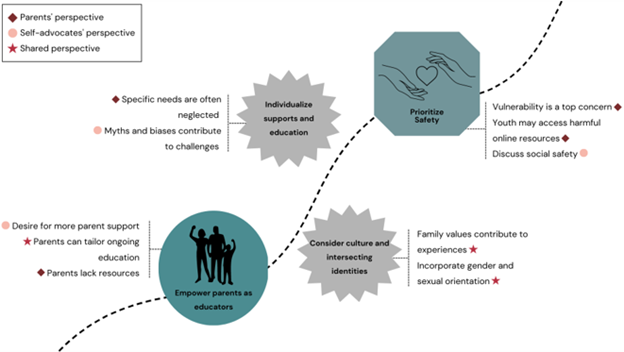Sexual Health
Parent-Focused Sexuality Education Program for Autistic Youth
Principal Investigator: Lindsey DeVries, PhD
Sponsor: Organization of Autism Research (OAR)
COMIRB #: 23-2439
About the Research: This research aims to evaluate the effectiveness of an 8-week online group program for parents and caregivers of preteens and teenagers with autism spectrum disorder (ASD) navigating puberty compared to a sexual health resource guide. All research will take place online. Two types of participants are being recruited.
1. Parent/Caregiver Group Participants and their Autistic Children
2. Autistic Young Adults to serve on an Advisory Board
Eligible parents or caregivers to participate in the group intervention include:
- Have a child between the ages of 10 and 18 with a medical diagnosis of ASD or a school designation of ASD on their IEP or suspected ASD
- Have access to reliable internet and the ability to participate in an online group
- Child must use fluent language/complex sentences as a primary means of communication
- Children with an additional diagnosis of intellectual disability will be excluded
Eligible advisory group members include:
- Adults (ages 18-25) with a medical diagnosis of ASD or a previous school designation of ASD on their IEP
- Autistic adults with a diagnosis of intellectual disability will be excluded
- Have access to reliable internet and the ability to participate in an online group
Fees & Compensation
This group will be offered free of charge. Compensation will be provided for completing pre- and post-measures for all group members and child participants. Advisory group members will be compensated for their time.
Contact
Please feel free to refer potential eligible participants for this study. Contact Lindsey DeVries, PhD at [email protected] or 720-777-9961 for additional information.
The Birds and Bees: A pilot study of a parent-led sexual health program for Autistic Youth
Authors: Lindsey DeVries, PhD, Kelly Cosgrove, PhD, Ilana Hayutin, BS, Christine Dub, PhD, Valentina Postorino, PhD, & Caitlin Middleton, PhD
What is the goal of the study? The goal of this study is to make a group curriculum (Birds & Bees) to support parents in teaching their autistic children about issues related to sexual and reproductive health and growing up.
What did we find? Parents who completed the Birds & Bees group rated it as helpful in supporting their autistic teens and preteens. Parents also showed increases in knowledge of sexual health content, their ability to be sexual health educators to their child, and positive expectations of the impact of this group in their ability to support their child through adolescence.
What did we learn? Preliminary evidence indicated that the Birds & Bees program can help empower parents as sexual health educators to support their autistic teens and preteens through puberty.
Why is this important? Many parents report feeling ill-equipped to discuss sex, puberty, and other issues related to adolescence with their autistic preteens and teens. Autistic youth are also less likely to receive comprehensive sex education than their peers and many sexual health curriculums do not cover issues that are important to autistic individuals, such as sensory considerations, gender identity and sexuality, and relationships.
Contact information: Lindsey DeVries, PhD
This project was funded by the Autism Intervention Research Network on Physical Health (AIR-P).
The Birds and the Bees Abstract from International Society for Autism Research (INSAR) Conference 2023.
“It’s really complicated”: Engaging key stakeholders to inform a novel parent-led sexual health education program for autistic youth
Authors: Kelly Cosgrove, PhD, Caitlin Middleton, PhD, Talia Thompson, PhD, Brian Be, & Lindsey DeVries, PhD
What is the goal of the study? The goal of this qualitative study is to examine the experiences, needs, and opinions of autistic adults and parents of autistic youth to inform the creation of a parent-led sexual health program (the Birds & Bees program).
What did we find? After conducting two rounds of separate focus groups with parents and autistic adults, we found four overarching themes: Parents need to be empowered as educators, support and education needs to be individualized, culture and intersecting identities should be considered, and safety should be a top priority.
What did we learn? This is the first study to examine the overlapping experiences, needs, and opinions between autistic individuals and parents of autistic youth related to sexual health education. Parents and autistic adults had a number of shared opinions related to sexual health education and how to best support young people with autism. See the figure below for more information regarding the similarities and differences between these groups.
Why is this important? Sexual health education for autistic youth is often lacking compared to peers who do not have autism and there is little consensus as to who should provide sexual health education to these teens and preteens. This study is an important step in understanding the needs, experiences, and challenges of both autistic adults and parents of autistic youth in order to create programming that fits their needs.
Contact information: Lindsey DeVries, PhD
"It's really complicated" Abstract from International Society for Autism Research (INSAR) Conference 2023
